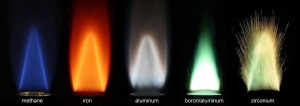
Metal powders could be viable alternative to fossil fuels
December 15, 2015
By
CCE

Stabilized flames of different metal powders burning with air, compared to a methane-air flame. Alternative Fuels Laboratory, McGill University. (c) Elsevier.
.
Researchers at McGill University in Montreal are investigating using metal powders, such as those produced from iron in the metallurgy, chemical and electronic industries, as an alternative to fossil fuels for external combustion engines. They could be used as an alternative to gasoline for cars.
McGill University professor Jeffrey Bergthorson is the lead author of the study which is published in the December 2015 issue of the journal Applied Energy. Bergthorson is a mechanical engineering professor and associate director of the Trottier Institute for Sustainability in Engineering and Design at McGill. He worked with five other McGill researchers and co-author David Jarvis, head of strategic and emerging technologies at the European Space Agency.
Bergthorson explained why they are so enthusiastic about the potential of metal powders in an article in McGill University’s online news published December 9.
“Technologies to generate clean electricity – primarily solar and wind power – are being developed rapidly; but we can’t use that electricity for many of the things that oil and gas are used for today, such as transportation and global energy trade.
“Biofuels can be part of the solution, but won’t be able to satisfy all the demand; hydrogen requires big, heavy fuel tanks and is explosive, and batteries are too bulky and don’t store enough energy for many applications. Using metal powders as recyclable fuels that store clean primary energy for later use is a very promising alternative solution.”
Metal powders are similar in size to fine flour or icing sugar. They have been used for centuries, such as in fireworks and rocket propellants. When burned, they react with air to form stable, nontoxic solid-oxide products that can be collected relatively easily for recycling. The researchers believe that iron powders, which are already plentifully produced for the metallurgy, chemical and electronic industries, are a prime candidate.
The McGill researchers’ next step is building a prototype burner coupled with a heat engine.
To read the article in the McGill news, click here.
To read the article in Applied Energy, click here.